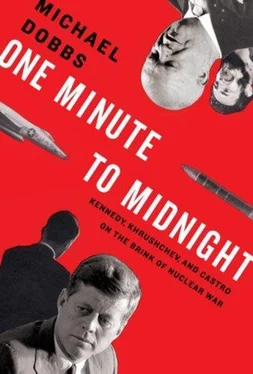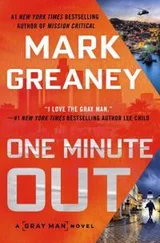Valentin Polkovnikov: Yesin et al., Strategicheskaya Operatsiya Anadyr’, 189.
“Why can’t we retaliate?”: Anatoly I. Gribkov and William Y. Smith, Operation ANADYR: U.S. and Soviet Generals Recount the Cuban Missile Crisis (Chicago: Edition Q, 1993), 57.
“Only someone with no”: Ibid., 55.
By October 23, 42,822 Soviet: Gribkov et al., U Kraya Yadernoi Bezdni, 100.
Overnight, the missile sites: Yesin et al., Strategicheskaya Operatsiya Anadyr’, 173; blast information provided by Gen. Viktor Yesin—interview, May 2006.
“Other people are deciding”: Tomas Gutierrez Alea and Edmundo Desnoes, Memories of Underdevelopment (Pittsburgh: Latin American Literary Review Press, 2004), 171.
“The poster”: Adolfo Gilly, Inside the Cuban Revolution (New York: Monthly Review Press, 1964), 48.
“It looks like it’s going”: I have relied on Stern, Averting “ The Final Failure, ” 204, for the unexpurgated version of this exchange.
“I fought in three”: Abel, 116.
“Here lie the Soviet diplomats”: Reeves, 397.
“Why is it”: David Halberstam, The Best and the Brightest (New York: Random House, 1972), 269.
“In the Navy, the ethos”: Author’s interview with Capt. William D. Hauser, Gilpatric naval aide, May 2006.
“Keep a firm grasp”: Time magazine profile of Anderson, November 2, 1962.
“From now on”: Anderson memo to McNamara, October 23, 1962, CNO Cuba, USNHC.
“locking the barn door”: Transcript of Joint Chiefs of Staff meetings, Havana 2002, vol. 2.
The admiral resented McNamara’s: George Anderson OH, USNHC.
“We’ll hail it”: Blight and Welch, On the Brink, 64.
“It’s all in there”: Abel, 137; Joseph F. Bouchard, Command in Crisis (New York: Columbia University Press, 1991), 115. Abel and other writers misidentified the publication cited by Anderson as the Manual of Naval Regulations. As Bouchard points out, this manual contains no guidance on the conduct of blockades. Law of Naval Warfare is available through USNHC, no. NWIP 10-2.
“This is none of your goddamn”: Roswell Gilpatric OH, JFKL. Anderson denied using strong language, but conceded making “a good-humored remark” about the Navy knowing how to run blockades.
“You heard me”: McNamara interview.
The clash between: Following Abel, 135-8, most authors say this scene took place on the evening of Wednesday, October 24, despite McNamara’s recollection that it was the evening of October 23, prior to the imposition of the quarantine. The records show that Anderson left the Pentagon at 2035 on October 24; McNamara visited Flag Plot at 2120, where he met with one of Anderson’s deputies—CNO Cuba files, CNO Office logs, USHNC; see also McNamara office diaries, OSD.
“I don’t know how”: Sources for this scene include Kennedy, Thirteen Days, 65-6; Anatoly Dobrynin, In Confidence (New York: Random House, 1995), 81-2; and the reports filed by both men immediately afterward. RFK’s version is reprinted in FRUS, Vol. XI, 175; an English trans. of Dobrynin’s October 24, 1962, cable can be found in CWIHP, 5 (Spring 1995), 71-3.
The mass media had always: Tad Szulc, Fidel: A Critical Portrait (New York: William Morrow, 1986), 465. I have relied on Szulc for most of Castro’s early biographical details.
“Fatigued by talking”: “The Fidel Castro I know,” Gabriel Garcia Marquez, Cuba News, August 2, 2006.
The streets of Havana: Prensa Latina dispatch by Sergio Pineda, October 24, 1962.
“They were geared”: Maurice Halperin, Rise and Decline of Fidel Castro (Berkeley: University of California Press, 1972), 191.
“We have won the war”: Szulc, 30.
“a much bigger”: Ibid., 51. Castro later claimed that he wrote this letter at a time of great emotion and that it did not reflect his true feelings toward America. His argument is unconvincing, and seems geared to an international audience. Copies of the letter to Sanchez are prominently displayed in Cuban museums for the domestic audience.
“We are going ahead”: Hugh Thomas, Cuba: The Pursuit of Freedom (New York: Harper & Row, 1971), 445.
“an illiterate and ignorant”: Halperin, 81.
The sugar harvest: Ibid., 124-5, 160.
“sectarianism”: See, e.g., report of Hungarian ambassador Janos Beck, December 1, 1962, Havana 2002, vol. 2.
When Khrushchev first broached: See, e.g., Alekseev quoted in Fursenko and Naftali, One Hell of a Gamble, 179.
“many mobile ramps”: Mary McAuliffe, CIA Documents on the Cuban Missile Crisis (Washington, DC: Central Intelligence Agency, 1992), 105. The pilot’s name was Claudio Morinas. The report was disseminated within the CIA on September 20, 1962.
“missiles on Cuban territory”: Henry Brandon, Special Relationships (New York: Atheneum, 1988), 172.
“the pass at Thermopylae”: Szulc, 445.
Carved out of the soft limestone: Author’s visit to Cueva de los Portales, March 2006. The caves have been turned into a museum and shrine to Che.
“an extraordinary man”: Jorge Castaneda, Companero: The Life and Death of Che Guevara (New York: Knopf, 1997), 83.
“our old, much lamented”: Ibid., 62.
“too much freedom”: Ibid., 71.
Castro had reserved half: Blight and Welch, On the Brink, 398.
Timur Gaidar: The father of Yegor Gaidar, Russia’s first post-Communist prime minister. Decades later, Yevtushenko gleefully told the story of how, as a small boy living with his father in Havana, the father of Russian capitalism “pissed on my beautiful white suit”—author’s interview, June 2006. See also Yevtushenko, article in Novaya Gazeta, July 11, 2005.
“Has Moscow called?”: Timur Gaidar, Grozi na Yuge (Moscow: Voennoe Izdatelstvo, 1984), 159.
CHAPTER FOUR: “EYEBALL TO EYEBALL”
The previous evening, he and other: NYT, October 24, 1962; Foy Kohler cable to State Department 1065, October 24, 1962, SDX.
“Why, that’s Karl”: Knox notes on meeting, JFKL.
“If I point a pistol”: Beschloss, 496.
“disappear the first day”: Roger Hilsman memo to secretary of state, October 26, 1962, OSD.
“Saying Grace”: Reeves, 410.
“He opened and closed”: RFK, 69-70.
“probably the most memorable day”: Dobrynin, 83.
“massive uncertainty”: NYT, October 28, 1962.
“sat around wondering”: Clinton Heylin, Bob Dylan: Behind the Shades Revisited (New York: HarperCollins, 2001), 102-3; see also Dylan interview with Studs Turkel, May 1, 1963.
“We’re eyeball”: Rusk, 237.
“The meeting droned on”: RFK, 72.
“SECRET. FROM HIGHEST”: CINCLANTFLT message 241523Z, CNO Cuba, USNHC. The order was also passed on by single sideband radio from Navy Plot—Vice Adm. Griffin notes, October 24, 1962, CNO Cuba, USNHC.
The Kimovsk was nearly: The Kimovsk ’s position at 0930, October 24, was 27deg18’N, 55deg42’W, according to CINCLANTFLT message 241950Z, CNO Cuba, USNHC. The Essex ’s position at 0900 on October 24 was 23deg20’N, 67deg20’W, according to ship logs now at NARA. Erroneous accounts of Soviet ship positions are given in Graham Allison and Philip Zelikow, Essence of Decision, 2nd ed. (New York: Longman, 1999), 233, 348-9, and Fursenko and Naftali, Khrushchev’s Cold War, 477, 615. The U.S. Navy concluded on October 25 that the Soviet ships had turned around at 0700 Zulu time on October 23, 3:00 a.m. in Washington, 10:00 a.m. in Moscow—CNO Office logs, October 25, USNHC. According to Soviet records, the turnaround orders began going out at 6:00 a.m. on October 23—see notes in chapter two.
Читать дальше












